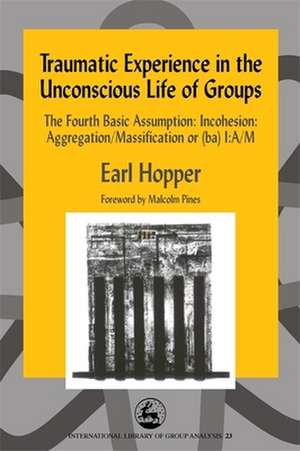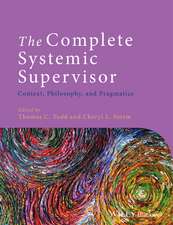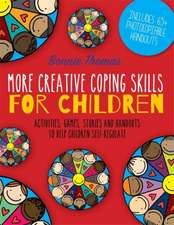Traumatic Experience in the Unconscious Life of Groups: A/M: International Library of Group Analysis, cartea 23
Autor Earl Hopper Malcolm Pines, Richard Billowen Limba Engleză Paperback – 31 mar 2003
Din seria International Library of Group Analysis
- 22%
 Preț: 368.07 lei
Preț: 368.07 lei - 25%
 Preț: 220.34 lei
Preț: 220.34 lei - 27%
 Preț: 382.28 lei
Preț: 382.28 lei - 22%
 Preț: 223.20 lei
Preț: 223.20 lei - 22%
 Preț: 250.45 lei
Preț: 250.45 lei - 5%
 Preț: 334.59 lei
Preț: 334.59 lei - 26%
 Preț: 212.91 lei
Preț: 212.91 lei - 26%
 Preț: 212.12 lei
Preț: 212.12 lei - 5%
 Preț: 336.29 lei
Preț: 336.29 lei - 26%
 Preț: 235.76 lei
Preț: 235.76 lei - 5%
 Preț: 270.74 lei
Preț: 270.74 lei - 5%
 Preț: 336.19 lei
Preț: 336.19 lei -
 Preț: 340.54 lei
Preț: 340.54 lei -
 Preț: 358.37 lei
Preț: 358.37 lei - 5%
 Preț: 395.91 lei
Preț: 395.91 lei
Preț: 351.53 lei
Preț vechi: 370.03 lei
-5% Nou
Puncte Express: 527
Preț estimativ în valută:
67.27€ • 70.41$ • 55.99£
67.27€ • 70.41$ • 55.99£
Carte tipărită la comandă
Livrare economică 31 martie-14 aprilie
Preluare comenzi: 021 569.72.76
Specificații
ISBN-13: 9781843100874
ISBN-10: 1843100878
Pagini: 240
Dimensiuni: 156 x 233 x 13 mm
Greutate: 0.35 kg
Editura: JESSICA KINGSLEY PUBLISHERS
Seria International Library of Group Analysis
Locul publicării:United Kingdom
ISBN-10: 1843100878
Pagini: 240
Dimensiuni: 156 x 233 x 13 mm
Greutate: 0.35 kg
Editura: JESSICA KINGSLEY PUBLISHERS
Seria International Library of Group Analysis
Locul publicării:United Kingdom
Notă biografică
Earl Hopper, Ph.D., is a psychoanalyst, group analyst and organisational consultant in private practice. He is a supervisor and training analyst for the Institute of Group Analysis, the British Association of Psychotherapists and the London Centre for Psychotherapy. An honorary tutor at The Tavistock and Portman NHS Trust and a member of the Post-Doctoral Program at Adelphi University, New York, Earl Hopper is a past President of the International Association of Group Psychotherapy and a past Chairman of the Group of Independent Psychoanalysts of The British Psychoanalytical Society.
Cuprins
Foreword, Malcolm Pines, Institute of Group Analysis, London. Acknowledgements. Introduction. 1. The Theory of Cohesion Proposed by Bion and Turquet, and Modified by Others. 2. The Fear of Annihilation and Traumatic Experience. 3. The Fourth Basic Assumption: Incohesion: Aggregation/Massification or (ba) I:A/M. 4. The Personification of Incohesion: Aggregation/Massification. 5. The Treatment of Difficult Patients in Clinical Group Analysis: The Personification of Aggregation by Pandoro. 6. The Personification of Massification by Pandora. 7. An Illustration of Incohesion: Aggregation/Massification in the Extreme: A Group of Child Survivors of the Shoah. 8. Summary, Invited Critical Commentaries, Discussion and Suggestions for Further Research and Applications: Richard M. Billow, Howard Kibel, Malcolm Pines, Bennett Roth, Jill Savege Scharff and David E. Scharff, Victor L. Schermer, Walter Stone. Appendix I: Some Conceptual Distinctions about Social Formations from Sociology and Social Psychology. Appendix II: Encapsulation as a Defence against the Fear of Annihilation. References. Subject Index. Author Index.














